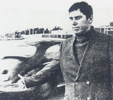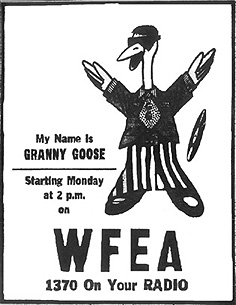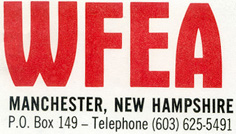

 |
 |
| 1930s
| 1940s
| 1950s
| 1960s | 1970s
| 1980s
| 1990s
| 2000+ Blaw Knox tower | 1938 Hurricane | 75th Anniversary | Recollections | Music Surveys |
|
|
As WFEA began the 1960s, it leaned heavily on the Top 40 music that was sweeping America. While providing news and public affairs programming, the thrust was primarily rock and roll. Under Bill Malo and Frank Pellegrin's WFEA Broadcasting Corp., the station developed a reputation for being something of a revolving door for young disc jockeys. On-air stays were often short. Sometimes individuals left and came back; for example Jack Miller sat out parts of 1962-63 while he served his military obligation. There were at least three Jim Longs at WFEA (Don Davis and Pete Morrison were two of them). From 1960-65, programming was under the direction of Jim Camilli, a fast talking DJ who came from upstate New York. He employed whatever slick promotional ideas were sweeping the industry at the moment. Management wasn't above raiding the competition. In late 1964 WFEA stole WKBR's popular French-language music host, Joe Maltais.
In 1965 Charlie Shoe replaced Jim Camilli as program director, but he was stolen by WKBR program director Eddie B. Baker (another ex-WFEA DJ) in mid 1966. Many people found themselves in WFEA's driver's seat during the 1960s. It's unclear which of them made the decision to depart with continuous Top 40 music in October 1966. Gene LaVerne was associated with the station for 20 years off and on, starting as a singing cowboy and later spinning pop hits. Suddenly the Top 40 format was interrupted by country and western music every weeknight from 7PM-midnight.
In February 1967 Mark Century, Inc., a New York company that provided jingles, commercials and comedy drop-ins for more than 500 stations, announced it would buy WFEA. The $280,000 sale was completed May 16th. The new owners of Century Broadcasting Group, Inc. were music world heavyweights. The principals were composer Mitch Leigh, best known for Man of La Mancha, Virginia attorney Milton Herson and singer Steve Lawrence. There were at least eight minority stockholders. Century installed Ansel S. Chaney as general manager; he came from WXHR in Cambridge, MA and had previously managed stations in the Carolinas. |
VOICES OF THE 1960s Chuck O'Neil |
|
|
|
|
|
|
They modified the hard Top 40 sound with middle of the road hits in a format dubbed The Sound of the Good Life. One of the first things Century did was convince Mitch Leigh to compose "Song of New Hampshire" (listeners were invited to send for free records of it). Former WFEA deejay Steve Marcus refocused his career toward public affairs by hosting the nightly Impact phone-in show from 9-11PM. The deejay staff, formerly called The Swinging Guys, were renamed The Unknockables. |
|
|
|
|
|
Jim Demetry |
 Dick Blanchard 
Johnny Tripp |
Bill Lawrence |
|
In April, 1968, Rudolph S. Nelson, Jr., replaced Ansel Chaney as general manager; he soon signed WFEA to a two year contract with the ABC Contemporary Network. A year later Rudy Nelson was promoted to vice president of Century Broadcasting Group, Inc. |
 |
|
 c c |
| 1930s
| 1940s
| 1950s
| 1960s | 1970s
| 1980s
| 1990s
| 2000+ Blaw Knox tower | 1938 Hurricane | 75th Anniversary | Recollections | Music Surveys |
| © 2004-2025 Man From Mars Productions |